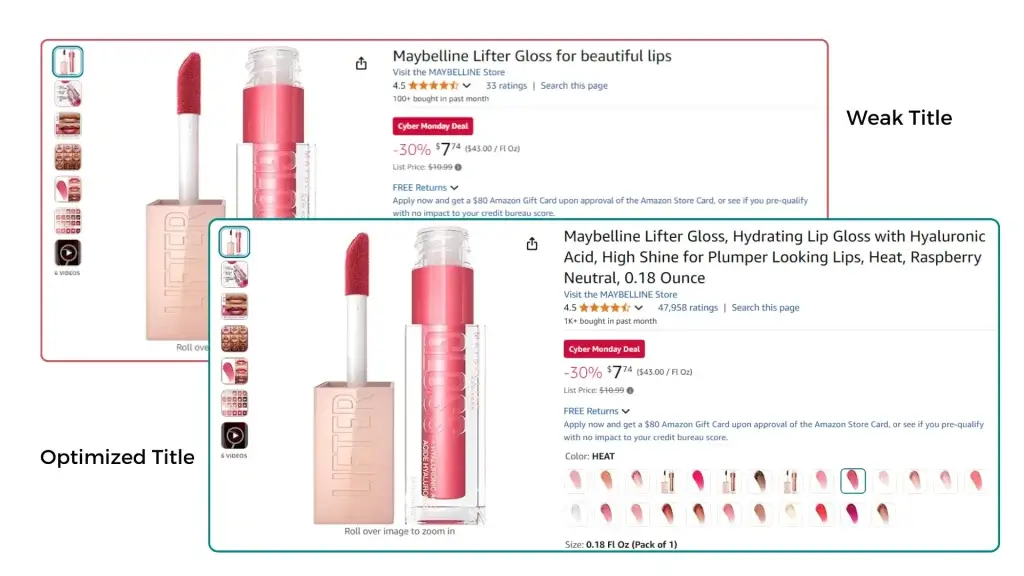Creating a successful Amazon product listing requires more than just a simple description; it’s all about precision. When sellers make Amazon product listing mistakes, they risk losing visibility, conversions, and sales. From poorly chosen keywords to low-quality images, even minor missteps can lead to missed opportunities.
However, understanding and avoiding common listing mistakes can improve your product’s reach and attract more customers. Small changes, like adding relevant keywords and clear descriptions, can significantly improve your listing’s performance.
In this guide, we’ll cover the top 11 Amazon product listing mistakes to avoid so you can enhance your listings, boost visibility, and increase sales on the platform.

Avoid These Amazon Product Listing Mistakes to Boost Sales
Following are the Common Amazon listing issues that many sellers make, which can impact visibility, reduce sales, and hinder growth.
- Poor Keyword Research
- Poor Product Titles
- Lack of compelling Product Descriptions
- Ignoring Bullet Points
- Keyword Stuffing
- Ineffective Use of Backend Keywords
- Poor Image Quality
- Incorrect or Misleading Product Pricing
- Neglecting Customer Reviews
- Failing to Monitor and Optimize Listings
- Not Paying Attention to Amazon’s Rules & Guidelines
1. Poor Keyword Research
Problem: Inadequate keyword research is one of the most critical Amazon product listing mistakes that can severely hinder your product’s search visibility. Your listings won’t appear in relevant searches without the right keywords, limiting potential sales.
Solution: Use keyword tools like Amazon’s Brand Analytics or other third-party platforms to identify relevant keywords. Include a mix of broad terms and specific phrases (long-tail keywords) that accurately describe your product. By doing this, your listing can appear in more searches and attract buyers ready to purchase.
For more insights on selecting impactful keywords, check out our guide on How to Find Amazon Keywords That Can Yield More Sales.
2. Weak Product Titles
Problem: Product titles that are unclear, too long, or don’t include the main features can confuse customers and impact your product’s visibility in search results.
Solution: Create a title that includes essential keywords and clearly describes the product type, brand, and key features.

For example, try this structure: “Brand – Product Type (Size, Color) – Key Features.” A robust and clear title can immediately grab attention, improve click-through rates, and help with Amazon SEO.
3. Boring or Generic Product Descriptions
Problem: If your product description is too short, generic, or doesn’t highlight benefits, customers may not fully understand why they need it, leading to missed sales.
Solution: Write a product description that clearly explains the features and benefits, making it easy for customers to see how your product can solve their problems.
Use keywords naturally in the description to improve Amazon rankings with SEO. Descriptions should be detailed but easy to read, giving customers confidence in your product.
4. Not Using Bullet Points
Problem: Bullet points help customers quickly understand the product’s key features. Ignoring them is one of the most common Amazon Product Listing Mistakes, making it harder for shoppers to scan and understand your product’s benefits.
Solution: Use bullet points to highlight the main features, materials, dimensions, and special details. Make each point clear and concise, focusing on benefits over technical details.
Bullet points improve readability and make your listing more appealing to shoppers, boosting engagement and search relevance.
5. Keyword Stuffing
Problem: Overloading your listing with keywords, known as “keyword stuffing,” can make your listing look spammy, confuse customers, and even lead to penalties from Amazon.
Solution: Use keywords strategically throughout your listing without overwhelming it. Place keywords naturally in titles, descriptions, and bullet points where they fit. A well-optimized listing reads smoothly and provides a positive experience while ranking well.
6. Misusing Backend Keywords
Problem: Backend keywords are hidden keywords that improve search visibility. Misusing them, like duplicating front-end keywords or adding irrelevant terms, can limit your listing’s reach.
Solution: Use backend keywords to include synonyms, alternative names, or other relevant terms that aren’t already in your title or description. Keep them relevant to avoid confusion, and don’t duplicate terms already used in the main listing.
7. Low-Quality Images
Problem: Blurry, dark, or poorly composed images can make products look unappealing. Low-quality images reduce trust and are less likely to catch a customer’s eye.
Solution: Use high-resolution images that show your product from different angles. Amazon requires images with a plain white background, so make sure yours are bright and clear. High-quality images improve the customer’s experience and help boost your Amazon rankings.
8. Incorrect or Misleading Pricing
Problem: Listing a product with clear and accurate prices can lead to customer satisfaction, complaints, and penalties, harming sales and reputation.
Solution: Always set transparent, competitive prices and check competitor prices regularly to ensure your pricing remains attractive. Amazon’s Automate Pricing tool can help you align your prices with market trends without compromising profit.
9. Ignoring Customer Reviews
Problem: Customer reviews significantly affect your listing’s credibility, and overlooking negative feedback is one of the critical Amazon Product Listing Mistakes you can make. Failing to address customer concerns can result in unresolved issues, fewer sales, and a lower ranking.
Solution: Monitor and respond to reviews regularly. Address customer concerns professionally and use feedback to make improvements. Encouraging positive reviews through good customer service can improve your reputation and help with Amazon rankings.
10. Failing to Monitor and Update Listings
Problem: Amazon’s market trends change frequently. Failing to update your listings based on performance and customer preferences can result in lower rankings and missed opportunities.
Solution: Use Amazon’s Brand Analytics tools to monitor your listings’ performance. Regularly update keywords, titles, descriptions, and images to stay competitive and improve visibility.
11. Not Following Amazon’s Rules and Guidelines
Problem: Overlooking Amazon’s listing guidelines can result in penalties, suppressed listings, or account suspension. Non-compliance is a significant risk for long-term sellers.
Solution: Familiarize yourself with Amazon’s rules and guidelines, especially regarding prohibited products, restricted categories, and content policies. Staying compliant avoids penalties and helps maintain a positive seller reputation.
Conclusion:
Avoiding common Amazon Product Listing Mistakes is critical to creating an effective, high-ranking listing that attracts shoppers and drives sales. From high-quality images to accurate descriptions and well-researched keywords, each element captures customer interest and boosts your visibility.
At The Techload, we help sellers refine their listings to avoid these pitfalls and position their products for maximum success. Let us help you create a standout Amazon presence that converts!
Amazon Product Listing Mistakes: FAQs
Critical mistakes include neglecting keyword research, poorly written titles, low-quality images, and ignoring bullet points. These errors can impact your listing’s visibility and lower sales potential.
Without targeted keywords, your product may not appear in relevant searches. Effective keyword research improves listing visibility, helping your product reach more potential buyers.
Bullet points make it easy for customers to understand key features at a glance. When used effectively, they highlight benefits and improve customer engagement, making your product stand out.
Yes, keyword stuffing can make content hard to read and negatively impact SEO rankings. Aim for a natural flow, using keywords that add clarity and value to your listing.
Customer reviews are critical for credibility and insights. Addressing feedback can improve trust, help boost rankings, and attract more buyers by showing that your brand cares about quality and satisfaction.






2 Responses